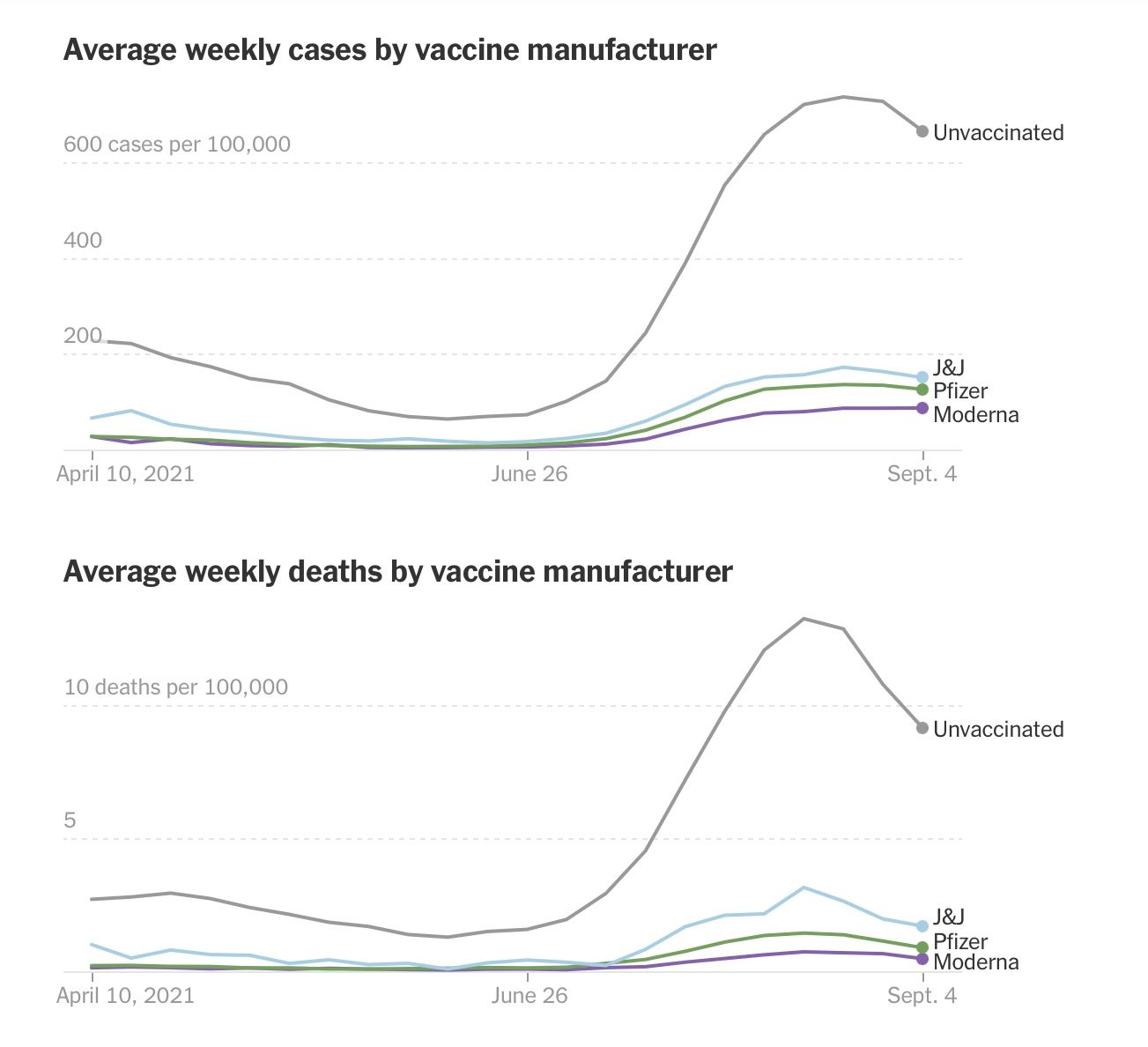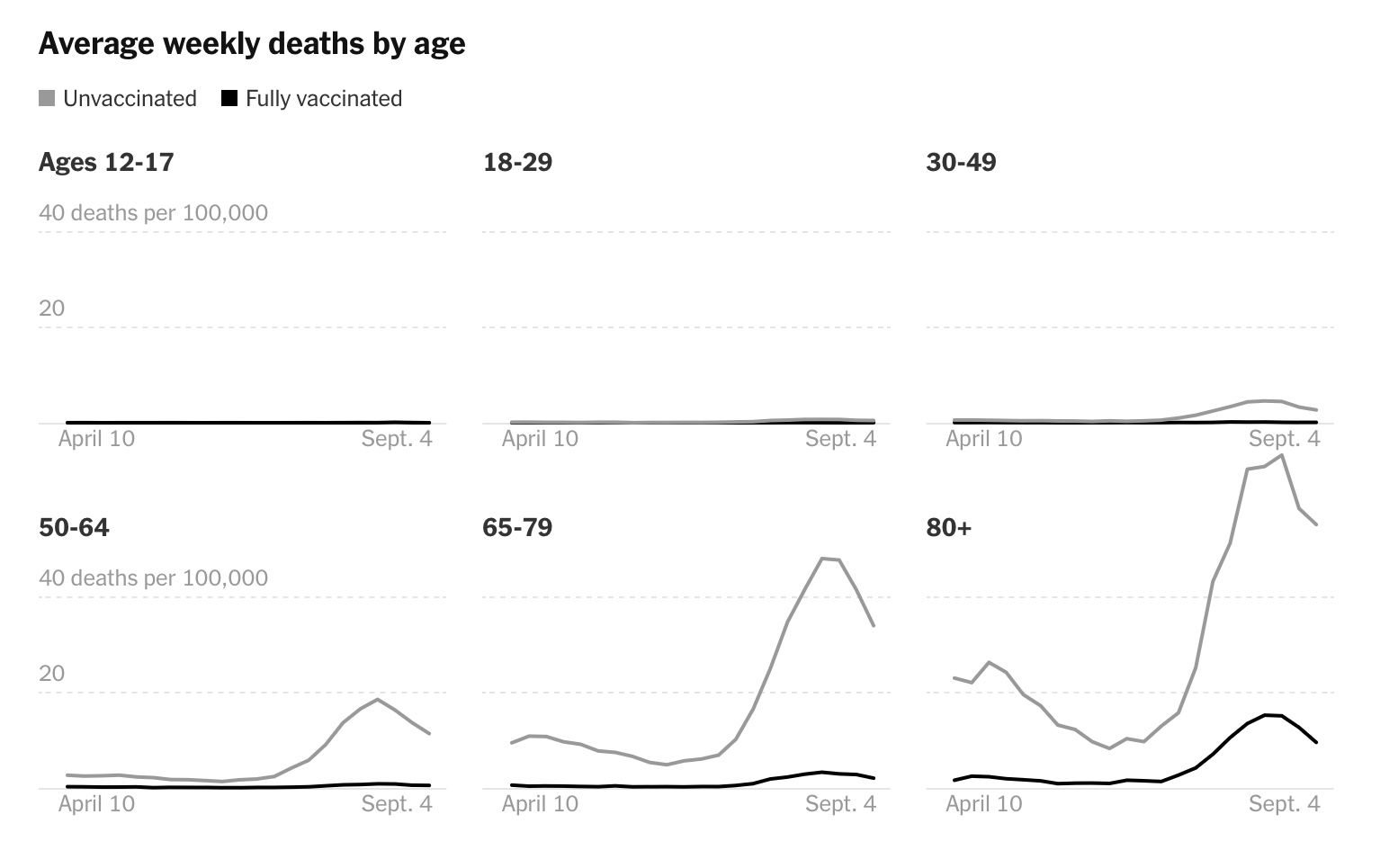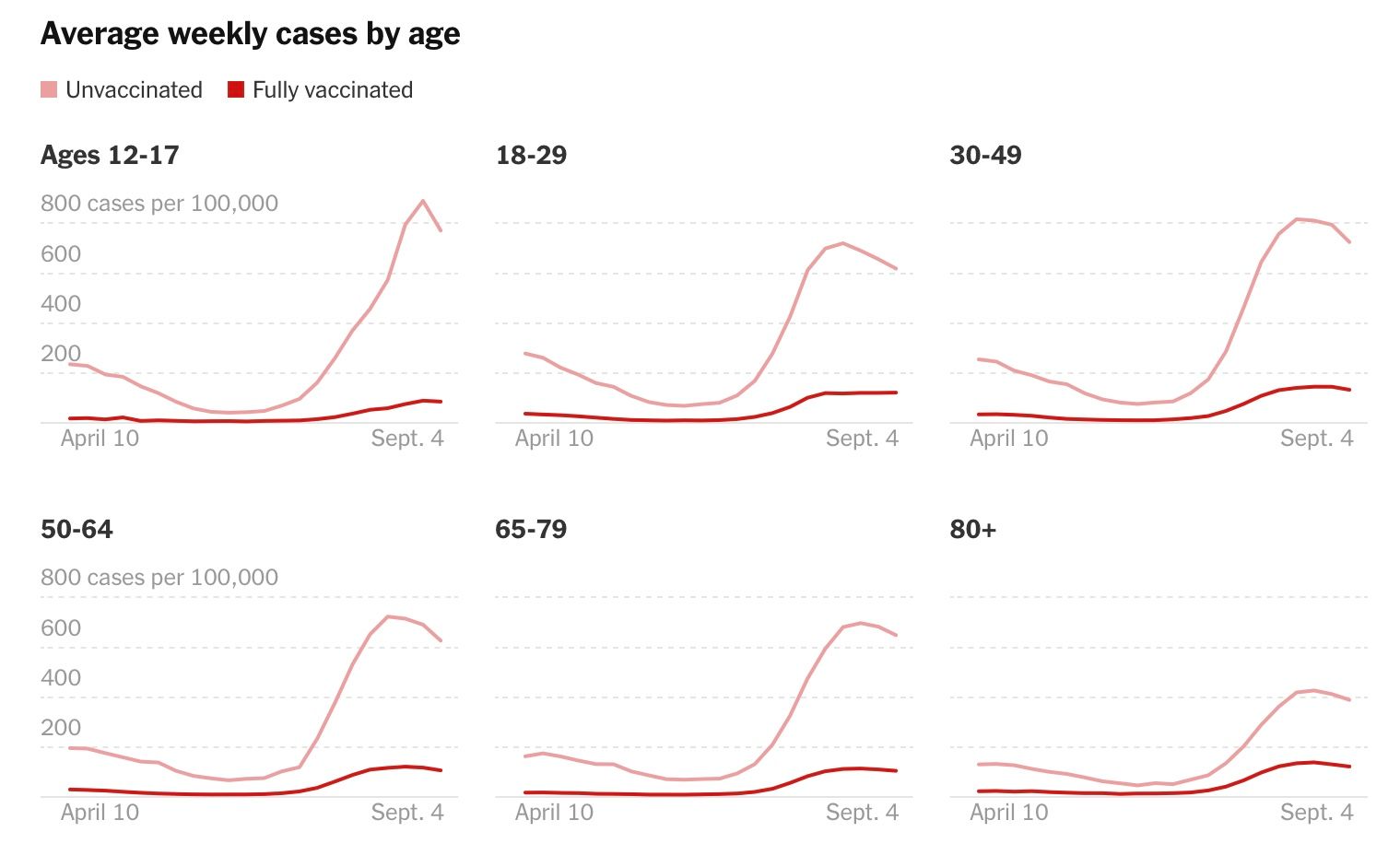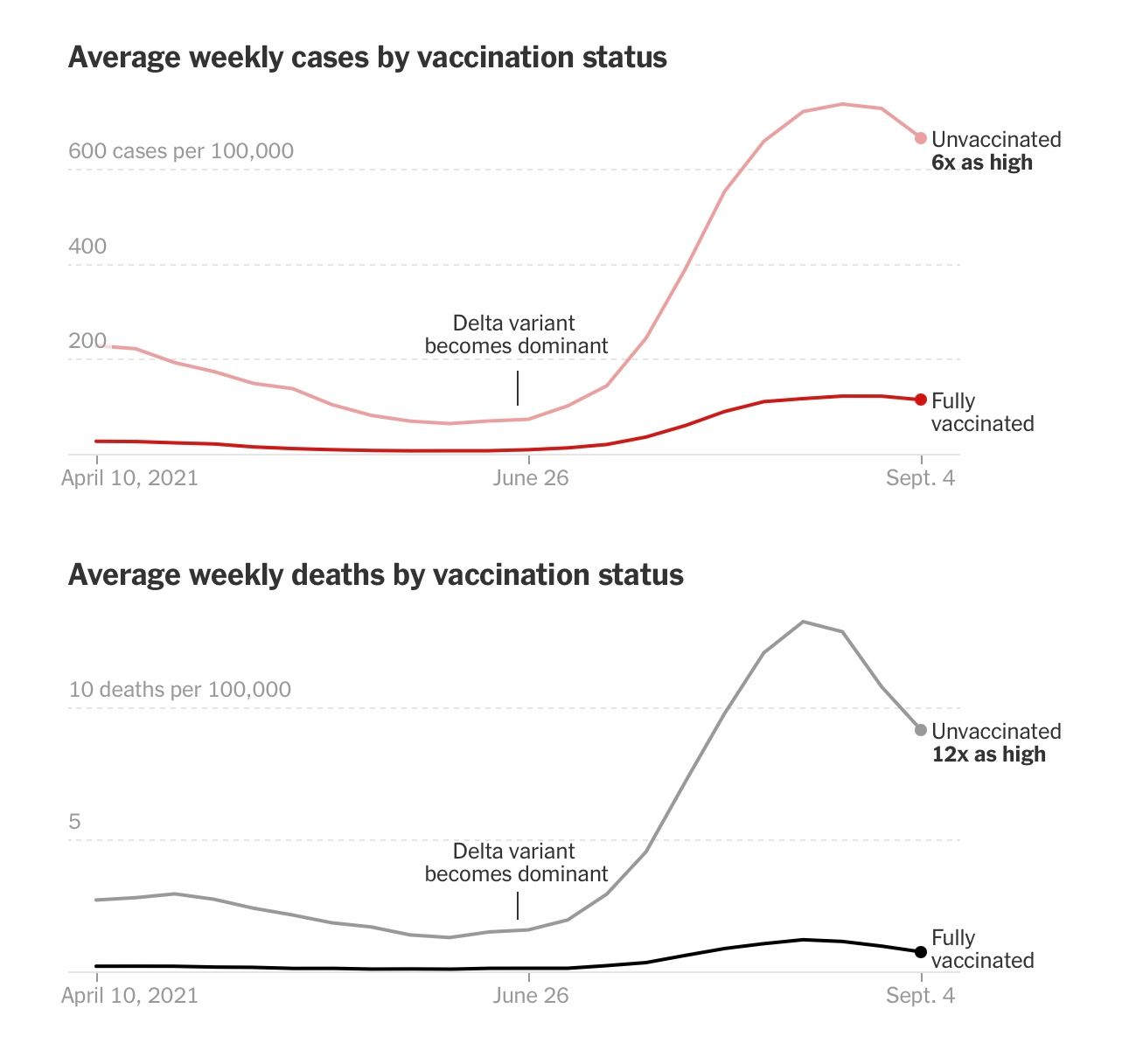Breakthrough infection stats
-
@jon-nyc These are BS stats. The Feds aren’t tracking breakthrough cases, only breakthrough hospital visits.
https://www.cdc.gov/vaccines/covid-19/health-departments/breakthrough-cases.html
CDC monitors reported hospitalized or fatal vaccine breakthrough cases for clustering by patient demographics, geographic location, time since vaccination, vaccine type, and SARS-CoV-2 lineage. Reported data include hospitalized or fatal vaccine breakthrough cases due to any cause, including causes not related to COVID-19..
We have no way of determining the full extent of breakthrough cases if they weren’t hospitalized for COVID.
Unless you think NPR and the CDC website are whack job conspiracy sites?
@lufins-dad assuming there are many breakthroughs unaccounted for, the stats still show that serious disease (a function of hospitalizations) and deaths are several magnitudes higher in unvaxxed.
so in order to protect as many people as possible including the unvaxxed safer, it’s vital to vaccinate as much as possible and keep prevalence low.
I’m not sure what difference it makes that the government counts only severe disease as breakthrough. It’s a function of viral prevalence.
-
Quite interesting data. But not really an surprise I dont think.
@taiwan_girl said in Breakthrough infection stats:
Quite interesting data. But not really an surprise I dont think.
Agreed, but nice to see. What I found somewhat poignant is there are essentially zero deaths (especially if you're vaccinated) until you get to the 65+ age range.
-
@taiwan_girl said in Breakthrough infection stats:
Quite interesting data. But not really an surprise I dont think.
Agreed, but nice to see. What I found somewhat poignant is there are essentially zero deaths (especially if you're vaccinated) until you get to the 65+ age range.
@89th said in Breakthrough infection stats:
@taiwan_girl said in Breakthrough infection stats:
Quite interesting data. But not really an surprise I dont think.
Agreed, but nice to see. What I found somewhat poignant is there are essentially zero deaths (especially if you're vaccinated) until you get to the 65+ age range.
Even unvaccinated, it's very low in the less than 60 bunch.
-
@lufins-dad assuming there are many breakthroughs unaccounted for, the stats still show that serious disease (a function of hospitalizations) and deaths are several magnitudes higher in unvaxxed.
so in order to protect as many people as possible including the unvaxxed safer, it’s vital to vaccinate as much as possible and keep prevalence low.
I’m not sure what difference it makes that the government counts only severe disease as breakthrough. It’s a function of viral prevalence.
@bachophile said in Breakthrough infection stats:
@lufins-dad assuming there are many breakthroughs unaccounted for, the stats still show that serious disease (a function of hospitalizations) and deaths are several magnitudes higher in unvaxxed.
so in order to protect as many people as possible including the unvaxxed safer, it’s vital to vaccinate as much as possible and keep prevalence low.
I’m not sure what difference it makes that the government counts only severe disease as breakthrough. It’s a function of viral prevalence.
The NPR article explains several reasons why it's important to have accurate breakthrough data, but in my opinion, the first is spread. There is a local story from July where a frigging Epidemiologist from John Hopkins attended a small gathering with 14 friends, all of whom were fully vaccinated. A week later, 13 of the 15 had contracted symptomatic COVID. 1 person of the 13 had to visit the hospital, so technically there was only 1 breakthrough from the 13. He published the account in the Baltimore Sun. 6 weeks later he published a second accounting that he had tracked 87 cases from that event (some vaxxed, some unvaxxed) and 6 people had been hospitalized (5 unvaxxed, 1 vaxxed). He pointed out that the original cause of spread for those 87 cases he tracked went back to 13 fully vaccinated people. We are blaming the spread on the unvaccinated and that simply isn't true. We could have 100% vaccination, and we would still have significant spread. The cases would have significantly better outcomes, but the spread would still be there. I would like to think that having accurate information about how this crap is spreading would be fairly important.
The second reason (and probably the most important) is trust. If I can't trust you to get and report these num bers accurately, then I can't trust your other numbers as well.
-
You yourself admitted that those vaccinated have overall significantly better outcomes so what the hell are we even talking about.
-
I feel like we're all saying flavors of the same ideas:
- Yes, vaccinations work and significantly help your odds if you get COVID
- Yes, people should get them
- No, people shouldn't be forced to
- Yes, government statistics aren't perfect
- Yes, in general they are accurate and support why folks should get vaccinated
-
I feel like we're all saying flavors of the same ideas:
- Yes, vaccinations work and significantly help your odds if you get COVID
- Yes, people should get them
- No, people shouldn't be forced to
- Yes, government statistics aren't perfect
- Yes, in general they are accurate and support why folks should get vaccinated
@89th said in Breakthrough infection stats:
I feel like we're all saying flavors of the same ideas:
- Yes, vaccinations work and significantly help your odds if you get COVID
- Yes, people should get them
- No, people shouldn't be forced to
- Yes, government statistics aren't perfect
- Yes, in general they are accurate and support why folks should get vaccinated
Not at all. I agree with 1-3, 4 and 5 I disagree with wildly except for the past supposition that the numbers still do support getting vaccinated.
-
Well...
https://www.thelancet.com/journals/laninf/article/PIIS1473-3099(21)00648-4/fulltext
Vaccination reduces the risk of delta variant infection and accelerates viral clearance. Nonetheless, fully vaccinated individuals with breakthrough infections have peak viral load similar to unvaccinated cases and can efficiently transmit infection in household settings, including to fully vaccinated contacts. Host–virus interactions early in infection may shape the entire viral trajectory.
-
At the very least, can we agree that people who don't get the vaccines are being selfish and kinda asshole-ish? (Unless you have a legit medical reason not to)
With the amount of safety data we have on this - it seems like it's safer to get this vaccine than it is driving on a highway (maybe not, but it feels pretty damn safe).
There are real social costs to people not getting the vaccine (over-filled hospitals, prolonging the pandemic)
-
At the very least, can we agree that people who don't get the vaccines are being selfish and kinda asshole-ish? (Unless you have a legit medical reason not to)
With the amount of safety data we have on this - it seems like it's safer to get this vaccine than it is driving on a highway (maybe not, but it feels pretty damn safe).
There are real social costs to people not getting the vaccine (over-filled hospitals, prolonging the pandemic)
@xenon said in Breakthrough infection stats:
At the very least, can we agree that people who don't get the vaccines are being selfish and kinda asshole-ish? (Unless you have a legit medical reason not to)
With the amount of safety data we have on this - it seems like it's safer to get this vaccine than it is driving on a highway (maybe not, but it feels pretty damn safe).
There are real social costs to people not getting the vaccine (over-filled hospitals, prolonging the pandemic)
There's so much there...
But, in essence, you're right. If you're vaccinated, you're much less likely to die, and get seriously ill.
But (and if I read this correctly), if you're vaccinated, and you break through, your likelihood of transmitting the virus is pretty high, even if you don't get sick.
-
At the very least, can we agree that people who don't get the vaccines are being selfish and kinda asshole-ish? (Unless you have a legit medical reason not to)
With the amount of safety data we have on this - it seems like it's safer to get this vaccine than it is driving on a highway (maybe not, but it feels pretty damn safe).
There are real social costs to people not getting the vaccine (over-filled hospitals, prolonging the pandemic)
@xenon said in Breakthrough infection stats:
At the very least, can we agree that people who don't get the vaccines are being selfish and kinda asshole-ish? (Unless you have a legit medical reason not to)
Seems obvious to me.
Does anyone here disagree?
-
-
?
define legit
Right or wrong a lot of people are legitimately terrified of the vaccine
I know, I know, everyone here is superior to that
So, sorry no, we don't all agree
And I have had 6 vaccinations in the last year, anyone who has had fewer is selfish
@copper said in Breakthrough infection stats:
?
define legit
Did you just bristle at me using a short form of “legitimate” or do you really want examples of conditions where people can’t get a vaccine for medical reasons?
Right or wrong a lot of people are legitimately terrified of the vaccine
I know, I know, everyone here is superior to that
This has nothing to do with “superior”. That’s some sort of cultural argument. I, for completely selfish reasons, want the number of vaccinations to get as high as possible so we can all better move on with our lives. I don’t really personally know or care about who these people are.
So, sorry no, we don't all agree
That’s an interesting argument. So you think these people may have an unjustified fear, that fear has negative implications for society, but their heart is in the right place so we should have kindness and understanding.
I didn’t realize you were so tolerant and empathetic.
And I have had 6 vaccinations in the last year, anyone who has had fewer is selfish
-
How are the unvaccinated being selfish, if they are the most likely to become seriously ill or die? Especially in light of George's Lancet article.
Remember, I told you that down here over the last month, about 20% of the COVID patients admitted to hospital were fully vaccinated.
-
How are the unvaccinated being selfish, if they are the most likely to become seriously ill or die? Especially in light of George's Lancet article.
Remember, I told you that down here over the last month, about 20% of the COVID patients admitted to hospital were fully vaccinated.
@jolly said in Breakthrough infection stats:
How are the unvaccinated being selfish, if they are the most likely to become seriously ill or die? Especially in light of George's Lancet article.
Remember, I told you that down here over the last month, about 20% of the COVID patients admitted to hospital were fully vaccinated.
Just so I understand, you’re saying there’s no social benefits of more people being vaccinated?
-
At the very least, can we agree that people who don't get the vaccines are being selfish and kinda asshole-ish? (Unless you have a legit medical reason not to)
With the amount of safety data we have on this - it seems like it's safer to get this vaccine than it is driving on a highway (maybe not, but it feels pretty damn safe).
There are real social costs to people not getting the vaccine (over-filled hospitals, prolonging the pandemic)
@xenon said in Breakthrough infection stats:
At the very least, can we agree that people who don't get the vaccines are being selfish and kinda asshole-ish? (Unless you have a legit medical reason not to)
With the amount of safety data we have on this - it seems like it's safer to get this vaccine than it is driving on a highway (maybe not, but it feels pretty damn safe).
There are real social costs to people not getting the vaccine (over-filled hospitals, prolonging the pandemic)
In what ways are they being selfish? In causing the virus to spread more? The vaccinated are doing so, too. Unfortunately, we have no numbers to guess by what amount, sure would be nice to quantify…
In endangering those that cannot take the vaccine or the vaccine is ineffective? Well, if the vaccinated are spreading as well and at significant levels, then the risk is still there.
-
@xenon said in Breakthrough infection stats:
At the very least, can we agree that people who don't get the vaccines are being selfish and kinda asshole-ish? (Unless you have a legit medical reason not to)
With the amount of safety data we have on this - it seems like it's safer to get this vaccine than it is driving on a highway (maybe not, but it feels pretty damn safe).
There are real social costs to people not getting the vaccine (over-filled hospitals, prolonging the pandemic)
In what ways are they being selfish? In causing the virus to spread more? The vaccinated are doing so, too. Unfortunately, we have no numbers to guess by what amount, sure would be nice to quantify…
In endangering those that cannot take the vaccine or the vaccine is ineffective? Well, if the vaccinated are spreading as well and at significant levels, then the risk is still there.
@lufins-dad said in Breakthrough infection stats:
@xenon said in Breakthrough infection stats:
At the very least, can we agree that people who don't get the vaccines are being selfish and kinda asshole-ish? (Unless you have a legit medical reason not to)
With the amount of safety data we have on this - it seems like it's safer to get this vaccine than it is driving on a highway (maybe not, but it feels pretty damn safe).
There are real social costs to people not getting the vaccine (over-filled hospitals, prolonging the pandemic)
In what ways are they being selfish? In causing the virus to spread more? The vaccinated are doing so, too.
Not nearly at the level of the vaccinated. They're also using significantly more resources in our medical system when they do get sick.
-
Medical resources are an issue that isn't going away, but COVID has been the scapegoat for some issues that were already present.
Medicine is quickly becoming overwhelmingly corporate with all the problems that MBA's, clipboard carriers and the government can bring to bear.
-
@lufins-dad said in Breakthrough infection stats:
@xenon said in Breakthrough infection stats:
At the very least, can we agree that people who don't get the vaccines are being selfish and kinda asshole-ish? (Unless you have a legit medical reason not to)
With the amount of safety data we have on this - it seems like it's safer to get this vaccine than it is driving on a highway (maybe not, but it feels pretty damn safe).
There are real social costs to people not getting the vaccine (over-filled hospitals, prolonging the pandemic)
In what ways are they being selfish? In causing the virus to spread more? The vaccinated are doing so, too.
Not nearly at the level of the vaccinated. They're also using significantly more resources in our medical system when they do get sick.
@aqua-letifer said in Breakthrough infection stats:
Not nearly at the level of the vaccinated.
There is no data to justify that supposition. As shown earlier in this thread, the stats for the breakthrough cases are only those cases that visit a hospital. They aren’t counting the others that have mild symptoms. There’s very good reason to believe the reported number of breakthrough cases are 1/10th the actual number or even less. After all, if 10% of unvaccinated cases result in hospitalization then the number should be far less for a vaccine that reduces the severity of the disease, no?



